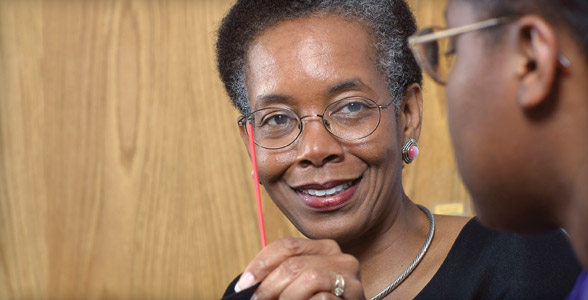By Diane Ballard
The majority of students can succeed at math and science. “They just need to be taught how,” says Dr. Saundra McGuire, a UT alumna and recent winner of the Presidential Award for Excellence in Science, Mathematics, and Engineering Mentoring.
McGuire is director of the Center for Academic Success at Louisiana State University. She says the earlier students learn how to learn, the better.
“Focusing on more effective learning strategies in middle school and high school will produce students who will be better critical thinkers when they reach the university level,” McGuire says. But even when they’re in college, it’s not too late. Whenever students understand that they can learn science and that the supposedly daunting subjects can even be interesting, she says they’re much more likely to try—and to succeed.
McGuire earned a Ph.D. in chemistry education from UT Knoxville in 1983, and she received the Chancellor’s Citation for Exceptional Professional Promise. She also holds a bachelor’s degree in chemistry, magna cum laude, from Southern University in Baton Rouge, Louisiana, and a master’s degree from Cornell University. She is a former chair of the American Chemical Society’s Committee on Minority Affairs.
The National Science Foundation, which administers the presidential awards, says they recognize the “critical importance of mentors in the academic and personal development of students and colleagues who are underrepresented in the fields of science, technology, engineering, and mathematics.”
McGuire says relatively few students pursue these fields because they’ve been led to believe they have to be exceptionally smart to succeed. “In fact, the vast majority of students have the ability to succeed. They just need to be taught how to learn science and math.”
McGuire began her mentoring ways at Cornell, where she was a teaching assistant for an introductory chemistry course. She says some minority students from inner-city high schools were struggling in the course.
“It wasn’t because they weren’t bright students,” she says. “It was just that their preparation had not been sufficient.” The students were trying to memorize the material rather than understand it. She launched a weekly training session for them, and she’s been mentoring ever since. She says many of her students have become scientists and doctors.
Memorizing rules and theories doesn’t provide the understanding necessary to solve problems, she says.
“The technique I teach is to focus on understanding the whys and hows of the information, not just the whats. Using metacognition—thinking about their own thinking—students learn to analyze the learning task and apply appropriate strategies to master the concepts. I suggest they develop ‘mini-lectures’ on topics they’re attempting to learn.” By “teaching” other students—or even stuffed animals—the students learn the material.
At UT, McGuire says she benefited from good mentoring.
“Professor Clifton Woods in chemistry was a great mentor, as was Professor [Luther] Kendall in educational psychology. My most important mentor at UT was Professor Paul Wishart, my Ph.D. thesis adviser. He was a great academician but was also very interested in his students’ personal and professional development. I will always remember how he and Mrs. Wishart treated his students as if we were their own family members.”
McGuire leads workshops throughout the country to help teachers learn to do more than just deliver instruction.
“I think it’s imperative for us to develop more effective teaching strategies for this generation of students,” she says. “The future of our country is at stake. We as faculty members must learn about the learning process so we can help our students develop effective strategies. Most college teachers were never taught this in their discipline-specific studies, but they’re anxious to learn it to improve their effectiveness in the classroom.”
When her students learn how to learn, McGuire is fulfilled.
“So often students give up on their goals because of academic setbacks. The ultimate reward for me is enabling students to successfully pursue their life goals.”



